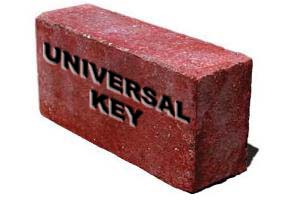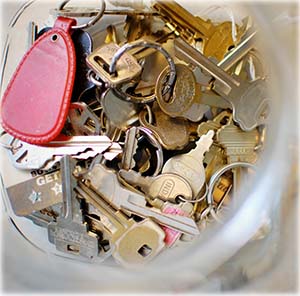Last week we kicked off our key system series with the post – 5 critical components of key systems. If you haven’t read it yet you should start there because today we’re diving into the first principle:
What key system philosophy do you want to follow?
Last week we discussed the different purposes key systems can serve, which should have given you a head start on this. Their purposes can range from the most basic function of simply locking the door to the more complex functions of restricting access to specific individuals at specific times to specific doors while providing audit reports. What you want your system to accomplish will guide you in selecting system and cylinder types. To best begin this process, let’s first discuss the different system types available – proprietary, restricted, and unrestricted keyways.
Does it concern you to consider the ease of which unauthorized people can copy store keys?
Your answer to this question will determine if you need a proprietary, restricted, or unrestricted keyway.
Unrestricted keyways
Unrestricted keyways are available to the locksmithing community; whereas, restricted keyways must be purchased from an authorized dealer. Proprietary systems take it a step further and are available only for one specific customer – no one else will ever be able to purchase a key blank for that system. There is no right or wrong way to set up your system; it all boils down to the needs of your facility.
What are others in the industry doing?
 One of our customers views their key system as a means of keeping the doors from blowing open. When designing their system, they said to us –
One of our customers views their key system as a means of keeping the doors from blowing open. When designing their system, they said to us –
“Everyone has a key to our store; it’s called a brick.”
As such, they rely on alarm systems to secure their facilities and use a low-cost key system with an unrestricted keyway. On the other end of the spectrum, we have customers who only want authorized individuals to have access to their keys which justifies the use of restricted systems.
So How Do I Know Which System Is Right For My Organization?
Remember the cost analysis from last week? The cost of the system increases as you go from unrestricted keyways to restricted to proprietary; however, with the additional cost, comes additional security. This week, we review the benefits and considerations of unrestricted keyways. We’ll discuss the other systems later in the series.
Unrestricted Keyways
 Unrestricted keyways are the least expensive and offer the benefit of same-day rekeys and key copies. Since the key blanks are widely available, a local locksmith, when given the proper keying information, can rekey a store on an emergency basis. Likewise, they can cut same-day keys. The disadvantage of the key blank being widely available is that keys can easily be copied without proper authorization. Yes, you may have “do not duplicate” stamped on your keys, but there is no legal punishment for those that make copies. There are self-serve kiosks at many of the big-box retailers that can copy these keys as well. As a result, any John Doe can get a copy of your store keys, and when an employee quits or is terminated, you may need to rekey the store regardless of whether or not they return the key. You don’t know if they made an unauthorized key copy or not. In the case with the company above that uses an unrestricted keyway, they simply change the alarm code when an employee leaves the organization. In rare and extreme cases, they will rekey the store as an added layer of precaution. Have any questions? Let us know in the comments and we’ll answer them next week when we dissect restricted and proprietary key systems!
Unrestricted keyways are the least expensive and offer the benefit of same-day rekeys and key copies. Since the key blanks are widely available, a local locksmith, when given the proper keying information, can rekey a store on an emergency basis. Likewise, they can cut same-day keys. The disadvantage of the key blank being widely available is that keys can easily be copied without proper authorization. Yes, you may have “do not duplicate” stamped on your keys, but there is no legal punishment for those that make copies. There are self-serve kiosks at many of the big-box retailers that can copy these keys as well. As a result, any John Doe can get a copy of your store keys, and when an employee quits or is terminated, you may need to rekey the store regardless of whether or not they return the key. You don’t know if they made an unauthorized key copy or not. In the case with the company above that uses an unrestricted keyway, they simply change the alarm code when an employee leaves the organization. In rare and extreme cases, they will rekey the store as an added layer of precaution. Have any questions? Let us know in the comments and we’ll answer them next week when we dissect restricted and proprietary key systems!
Check out our Key Systems 101 article for more information.
[maxbutton id=”1″]
Check out the rest of our series:
The Five Critical Components of Key System Management
Key System Types: Restricted, Unrestricted, and Proprietary
Proprietary & Restricted Key Systems
Standard Cylinders versus Interchangeable Cylinders – What’s the Difference?
eCylinders – The Amazing, The Mundane, and The Considerations
Rekeyable Cylinders – Fast, Easy, & Cost Effective
Master Key Systems – Controlled Access With One Key
Key System Policies – Keep Your System In Tact
Key System Procedures – A Roadmap for Maintaining Your System’s Integrity
Rekey Policies & Procedures – Three Elements to Consider
Key System Records Management – 4 Cornerstones

10 thoughts on “Key System Types: Proprietary, Restricted and Unrestricted Keyways”